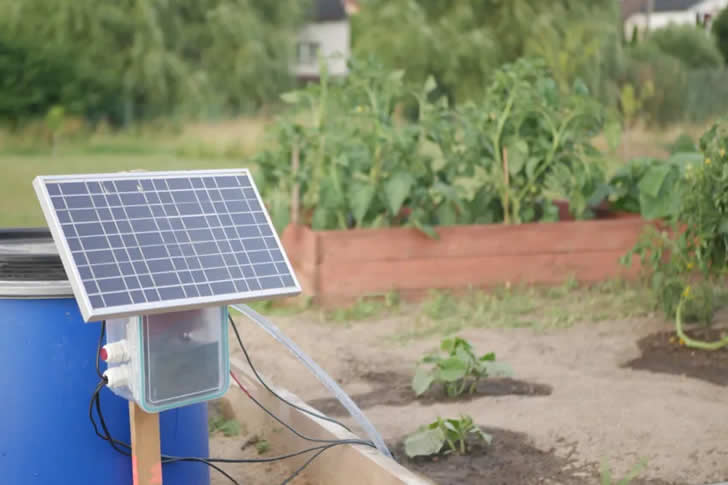A solar system can lower costs and improve the sustainability of your garden.

Benefits of a Solar System for Your Garden
Incorporating a solar system into your garden offers numerous advantages. From harnessing clean, renewable energy to reducing utility costs, solar power is an ideal solution for eco-conscious gardeners.
Reducing Energy Costs
Initial Investment vs. Long-Term Savings
: While the initial investment in solar technology may seem steep, the good savings on your energy bill make it worthwhile. Public sector incentives can also offset costs.Lowering Utility Bills
: Solar panels can significantly reduce or even eliminate your garden's electricity consumption and associated costs by powering lights, pumps, and other electrical equipment.
Sustainable Gardening
Environmentally Friendly Energy
: Using solar energy helps decrease your carbon footprint, contributing to less air pollution and a healthier environment.Energy Independence
: Having your own solar system ensures a consistent and reliable power source, crucial for automated garden systems, especially during power outages.
Planning Your Solar System for the Garden
A well-planned solar system is essential for maximum efficiency and cost-effectiveness. Here’s how to get started:
Assessing Energy Needs
Determine Power Requirements
: Calculate the wattage of all the electrical devices you plan to power using solar energy. This includes garden lights, water features, irrigation systems, and any other electronics.Energy Consumption Habits
: Track your garden’s energy usage over a week to get an understanding of peak hours and overall consumption.
Choosing the Right Solar Equipment
Solar Panels
: Opt for high-efficiency panels to maximize energy output. Factors such as size, quality, and brand will impact the initial costs.Batteries
: Invest in good-quality batteries that can store sufficient energy to power your garden overnight or during cloudy days.Inverters and Controllers
: Use a reputable inverter to convert solar energy into usable electricity. A controller helps regulate battery charging and ensures the system operates efficiently.
Site Evaluation and Installation
Optimal Positioning
: Position solar panels in a location that receives maximum sunlight throughout the day. Avoid shaded areas to ensure maximum energy absorption.Mounting and Angle
: Install panels at an angle that allows them to capture the very sunlight, typically corresponding to your location’s latitude.Professional Installation
: Though DIY setups can save money, hiring a professional ensures proper installation and connection, reducing the risk of damage and inefficiency.
Cost-Effective Tips for a Solar-Powered Garden
Leverage Public sector Incentives
Subsidies and Tax Credits
: Research and apply for federal, state, or local incentives which can significantly reduce your installation costs. Programs like tax credits or rebates can make solar systems more affordable.
DIY Solar Projects
Simple Solar Projects
: Start small with DIY solar garden lights or a solar-powered water fountain. These projects are low-cost and can boost your confidence before committing to a full system.Community Workshops
: Join workshops or online forums to learn from others who have installed solar systems in their gardens. This shared knowledge can help you avoid common pitfalls and save money.
Maintenance and Efficiency
Regular Cleaning
: Keep solar panels clean and affordable from debris to maintain their efficiency. A periodic wash ensures they are absorbing maximum sunlight.Energy-Efficient Devices
: Use energy-efficient pumps, lights, and appliances designed to operate with lower wattage. This reduces the overall load on your solar system.
Smart Garden Features
Automated Systems
: Utilize smart garden systems that can be programmed to operate during peak sunlight hours, optimizing energy consumption.Remote Monitoring
: Invest in remote monitoring systems to track your solar power production and consumption. This allows you to make informed decisions and adjust settings for better efficiency.
Enhancing Your Garden with Solar Power
Incorporating solar energy into your garden can also enhance its aesthetic and functional aspects:
Solar Lighting
Pathway Lights
: Use solar-powered lights to illuminate garden paths, enhancing safety and beauty without increasing energy costs.Accent Lighting
: Highlight important garden features, such as sculptures or plants, with solar accent lights to create a vibrant nighttime ambiance.
Water Features
Solar Fountains
: Install solar-powered water fountains to add tranquility and attract wildlife without the need for electric pumps.Pond Aerators
: Use solar aerators to ensure your garden pond remains oxygenated and healthy, especially during hot months.
Conclusion
Implementing a solar system in your garden not only helps in reducing energy costs but also promotes a sustainable lifestyle. By carefully planning your energy needs, choosing the right equipment, and staying informed about incentives, you can create an efficient, environmentally friendly garden. Investing in solar power is a step towards energy independence and a greener future for your garden.









